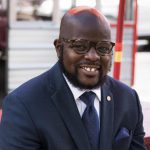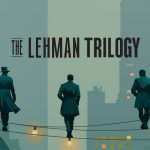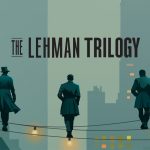Beethoven Festival Begins With a Bang
MSO kicks off Beethoven series with Ninth Symphony and a stage full of musicians and singers.

The Milwaukee Symphony Orchestra joins its Chorus and four choral soloists this week to deliver the first of three weeks dedicated to Beethoven.
If you’re going to play three straight weeks of Ludwig van Beethoven, you might as well go for the fences with one of the best-known works of all time — the Ninth Symphony.
At least that’s how Milwaukee Symphony Orchestra music director Edo de Waart figures it.
The MSO is amassing huge musical forces for its “Beethoven Festival,” which starts this week with the German composer’s last symphony, best known for the final movement’s iconic “Ode to Joy.” The concert, led by De Waart, features the full orchestra, four choral soloists and the Milwaukee Symphony Chorus.
In the next two weeks, the MSO will also perform Beethoven’s Eroica Symphony (No. 3) and Symphony No. 7. The festival will also include works by John Adams and Igor Stravinsky and performances by the concert saxophonist Timothy McAllister and international violinist Leila Josefowicz.
Considering it was was composed when he was completely deaf, the continuing impact of Beethoven’s Ninth is remarkable: it serves as the anthem for the European Union and joined the Pyramids of Giza and the Taj Mahal in 2002 when added as the first musical work on the World Heritage List.
“Every time I hear it, I feel tremendous joy,” says Susanna Phillips, a nationally acclaimed soprano who will join the MSO for the first time as one of the soloists. “I think it is one of Beethoven’s greatest achievements.”
The Ninth Symphony is in many ways the culminating piece of Beethoven’s lifework, premiering in Vienna in 1824. As the composer who spent his career filling the void left by the death of Mozart in 1971, Beethoven was a revolutionary figure who straddled the line between Classical and Romantic. Works like Beethoven’s “Moonlight Sonata” teeter between the two genres.
For Phillips, the transitional stage Beethoven stands upon adds to the mysterious quality of his work. She explains, “His passion and his inner angst come out in his music. He had to get out that turmoil inside of him, and for some reason, it translates very clearly.”
The Ninth was a historical marker that heralded a new age of Romanticism filled with emotional passion and innovation. It is the first piece ever to incorporate voices into a symphony, borrowing its text from a popular poem by Friedrich Schiller and focusing on the idea of universal brotherhood and love.
“It’s something that as humans, we all long for,” Phillips says. “We long for the community and bonds with other humans. It’s something so innate, and this piece really celebrates it.”
The vocal parts are not easy. Unlike many of his contemporaries, Beethoven approached the voice as if it was an instrument, Phillips says, adding challenging vocal leaps and a military-style recitative and requiring long stretches of singing. “Sometimes it’s difficult to find places to breath, and that can be quite challenging,” Phillips wryly notes.
While the textual context and historical backgrounds can enhance the piece, Phillips says, it’s also a work that allows audience members to sit down and “just get caught up in it.” Indeed, the fourth movement’s big tune is the sort that can leave audiences whistling as they leave the theater.
8 p.m. on March 21-22 and 2:30 p.m. on March 23, at the Marcus Center for Performing Arts. Tickets range from $22 to $82, available at the MSO’s website or by calling (414) 291-7605.
Fine Arts Quartet returns to Milwaukee
The internationally acclaimed Fine Arts Quartet will take a break from its world tour next week, returning to its hometown for just a short while before heading back on the road. Which is good new for local audiences. The FAQ, the quartet-in-residence at UW-Milwaukee, is scheduled to play for the last time this season at the school as well as at the Saint John’s On the Lake retirement location. The ensemble will take on such artists as Sergei Rachmaninoff, Dmitri Shostakovich, Robert Schumann and others throughout the week.
Boasting a list of over 200 recorded works, with a tradition that goes back 70 years, the FAQ is a world-class ensemble whose concerts can be enthralling.
3 p.m., March 30 at the Helene Zelazo Center. For more information, visit the FAQ’s website.
Spades concert by Concord Chamber Orchestra
The Concord Chamber Orchestra shuffles up its repertoire for the third of four concerts as part of its series themed off of a deck of cards.
This week’s concert, titled Spades, will focus on groundbreaking artists who “changed the course of music’s development,” such as Gustav Mahler, Dennis Bathory-Kitsz and Beethoven.
The concert will also include a performance of Felix Mendelssohn’s “Violin concerto in E minor,” with Elm Grove-native Wyatt Underhill serving as the solo violinist. Underhill, who is currently studying at the Julliard School, was the winner of the CCO’s annual Dorothy J. Oestreich Concerto Competition, granting him the chance to appear with the company in a performance of his choice.
8 p.m., March 22 at the St. Matthew Evangelical Lutheran Church. Tickets are $18, $12 for seniors and students, available at the CCO’s website.






















The pipe organ isn’t used in the performance of Beethoven’s 9th Symphony, is it? The reason I ask is that the photo shows the pipe organ.